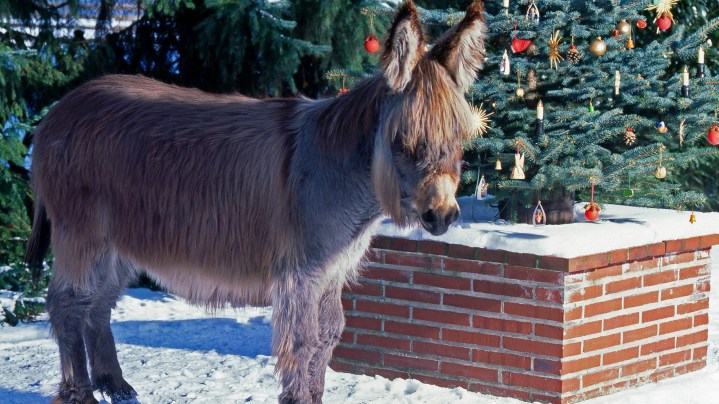Did You Know ‘El Burrito de Belén’ Is Not a Mexican Song?

(GERMANY OUT) Esel am geschmueckten Weihnachtsbaum im verschneiten Garten (Photo by Harald Langeullstein bild via Getty Images)
One of the Christmas season’s biggest hits is undoubtedly Hugo Blanco’s “El Burrito de Belén,” incorrectly though commonly known as “Mi Burrito Sabanero.” Since its release in 1972, the tune has only become more popular as different artists have covered the holiday staple. But did you know the aguinaldo folk song is actually Venezuelan and not Mexican, as many social media users assume?
Many social media users assume the traditional hit is Mexican, but that’s incorrect. The song was written by Blanco, who was a Venezuelan composer. It later became a mainstream jam after the Venezuelan children’s choir La Rondallita released their cover a few years later. Since then, the Venezuelan villancico has become one of the most popular holiday songs. It’s even considered No. 96 on Billboard’s “The 100 Best Christmas Songs of All Time.” The publication described it as “a simple yet rhythmic Venezuelan folk song [that] has become a timeless staple across Latin American countries and injects nostalgia every holiday season.”
Due in part to Billboard’s recent recognition, many social media users are making sure that online users don’t get the song’s origin mixed up. An X user wrote: “I come to remind you that ‘Mi burrito Sabanero’ is a Venezuelan song.” A Venezuelan-Labenese journalist expressed the same sentiment: “‘El burrito sabanero’ is perhaps Venezuela’s most important cultural export. Known throughout the hemisphere (and in Spain), there are covers by Juanes, Aventura, David Bisbal and even the City of Miami firemen.”
Over on TikTok, user @egamanww is also reminding the Internet users about the song’s history. After mentioning the song composer’s origin, he also defines the song as an aguinaldo, which is a traditional Venezuelan music genre. He also explains that aguinaldos normally talk about the birth of Baby Jesus, and points out the traditional instruments such as a cuatro, which is a guitar, maracas, furro, and tambora.

With this in mind, it’s great to see our Latine community’s hits being recognized. But it’s even more important, to give credit where it’s due.